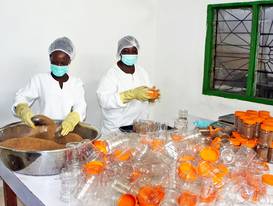
Recognized by industry leaders for extensive coverage on African Asset Management
Analysis & Strategy


Beyond seed funding to meet the potential of Africa’s tech sector
Rob Bergman explores the opportunities Series B and C funding on the continent. Rob is a Corporate Finance Principal at investment banking firm Bravura, which has won the Best Independent Advisory Firm AGF award for the third consecutive year (one overall and two for South Africa.)

Fintech ecosystem in Africa is entering into a new phase
The financial technology (fintech) ecosystem in Africa is entering into a new, exciting and challenging phase with more capital, more competition from incumbents from different quarters and more consolidation (M&A). As key segments grow, the rewards and risks grow for challengers and incumbents.

PE Investments Boost the Healthcare Sector in Egypt
Anna Lyudvig talks with Mediterrania Capital Partners' Daniel Viñas, Partner, and Khaled Saba, Egypt Senior Country Advisor.

African equities tailwinds picking up
Mr. Market has spoken, and inflation is on the way. From Bank of America, this found its way into this contributor’s inbox recently: “US 5-year, 5-year forward inflation swaps [i.e., the price rises investors expect from 2026 to 2031] are pricing inflation consistent with the highest we have seen the past five years. This is not about base effects given last year's weakness, not about anything temporary”.

We’ve come a long way since Cape to Cairo
The Cape to Cairo Road was an idea, birthed in the 1890s by British imperialists, for a pan-African highway, stretching from Cape Town in South Africa to Cairo in Egypt. The N1 in South Africa forms the first section of this now famous project and runs from Cape Town to Beit Bridge at the border of South Africa and Zimbabwe. In his February 2020 State of the Nation Address (SONA), President Cyril Ramaphosa acknowledged the role of infrastructure investment, including the rehabilitation of the N1, N2 and N3 highways, in helping dig the country out of its economic malaise. And he is right!

FX: Reaching for pocket change
I penned an article for Africa Global Funds magazine in 2016, which addressed some interesting observations from the foreign exchange (FX) challenges that presented themselves in the African capital markets over the period from 2015 to 2017. At the time, I was employed as a capital allocator and the experience gave me pause-for-thought that perhaps the dealing terms of most funds with Africa ex-SA listed equity strategies need to be reviewed. Specifically, I argued that redemption terms focus on the risk of a decline in underlying market liquidity in times of stress but still fail to adequately address FX liquidity risk, which, when challenges arise, often last much longer than the 3-months redemption notice period that is typically applied.

What It takes to reduce Market Data Costs?
The stress on financial research and market data strategies have never been higher. Market data strategies in organisations have been a common topic in recent years with most businesses trying to find ways to reduce their data spend. This topic has swiftly moved up the priority list with the impact of COVID-19 fundamentally changing the way we do business and increasing the cost pressures being exerted on firms.

Is the future of African FinTechs already here?
2020 has seen the wholesale acceptance of high-tech solutions and it is now a given that everything is touchless, paperless, remote and in the cloud. The world is on Zoom, using cryptocurrencies to buy groceries at the tap of a smartphone, everything can be ordered online, and we’re all going on holiday inside our VR headsets.

Private Equity in Africa: Outlook for 2021
In 2012, rockstar-turned-activist Sir Bob Geldof addressed the SuperReturn conference in Berlin, urging the US and European PE industry to turn its attention to Africa. He highlighted the opportunities to generate returns while leaving behind “firms, farms and factories” essential for the continent’s development. Eight years later and many PE sponsors have been drawn by Africa’s expanding economic growth and its youthful and rapidly growing population. Fundraising for the continent reached $3.8bn in 2019 according to the AVCA, the best year since 2015, and the number of PE deals successfully executed has risen consistently.

African Fintech sector: Growing up with Covid
The “narrative” around Financial Technology (fintech) in Africa is changing. Five years ago, discussion around fintech focused on the ecosystems; supporting start-ups in Cape Town, Nairobi and Lagos and elsewhere; the tech incubators; the number of fintechs (perhaps 500 by one count), and the number of African fintechs admitted to the prestigious Y-Combinator (or Y-C). Key players were a range of early-stage investors focusing on Seed rounds or Series A, including 12-J funds in South Africa, and a dozen or so VC-funds across the continent supported by development banks and some private, capital.

COVID-19 Increases the need for Impact Investing
COVID-19 turned 2020 in a tough year for most investors – especially those in emerging markets like Africa. Not only is Sub-Saharan Africa’s economy expected to post its first recession in 25 years, the World Bank also warns between 13 and 50 million people in the region could fall into extreme poverty due to the pandemic.

Understanding the rules of engagement and the ideal deal conditions in Africa
Despite the projected 3% contraction in Africa’s GDP in 2020 (IMF) followed by modest recovery next year, there remain unmatched investment returns on the continent. However, many investors continue to struggle with finding the “ideal deal” despite the significant foreign direct investment into Africa over the past few years, which saw inflows to the continent rising to $46bn in 2018 followed by an 11% increase in 2019 (UNCTAD’s World Investment Report 2019).

Finding the Best Solution to Investment Managers’ Technology Needs
Technology as an essential ingredient in investment management success is no longer in question. Running on a differentiating investment strategy and some Excel spreadsheets simply isn’t viable. Fast-paced global markets, asset diversification and complexity, data volumes, investor servicing demands and intense competition mean advanced system capabilities are a must-have.
